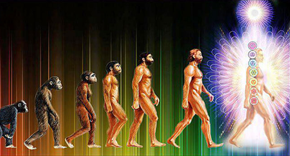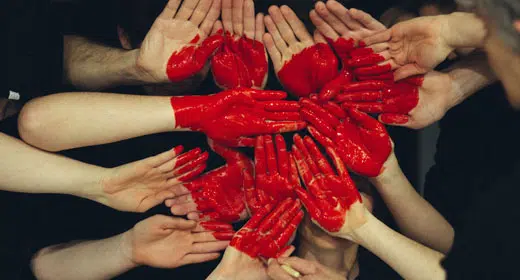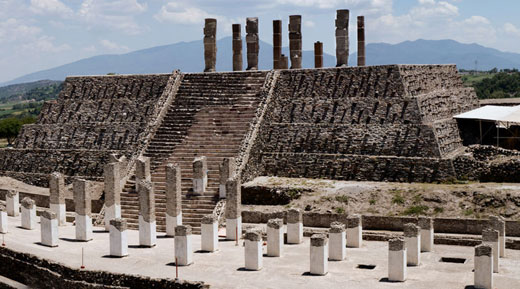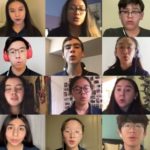Donna Quesada: And how do we balance our own individual awakening with the call for global action,
you know, which you are uniquely suited to talk about, I think. because from a very young age, you’ve been involved in these global issues. And I think that a lot of people say “well, why should I go out there and march… I have my own problems?” You know, how do we find that balance? Or is it a moot question?
Kiri Westby: No, I don’t think it’s a moot question. I think it’s actually a really important question about where’s the balance between our own self-preservation and helping others that might need help? Like, when do we know we have enough and what is enough? Is one house enough? Is two houses enough? What is enough? And when do we then say “okay, I’ve got my fair share. It’s time for me to start passing some along to those less fortunate”?
I think in the west, we have this idea that there is never enough, there’s no maximum amount of material stuff that you should have. It’s just… keep going, keep painting, keep acquiring, stop looking at those who have less… it must be their fault. They must have done something wrong along the way. That’s the opposite mentality. And so, I think the balance comes in sort of saying, what is it that brings me happiness? What is it that brings me comfort or happiness? How much of that do I need?
What I have found in my lifetime is that nothing brings me nearly as much comfort or happiness alleviating the discomfort of somebody else. So, while it feels good to put a coat on myself, it feels really good to put a coat on a stranger who’s really cold and doesn’t have a coat. And so, it’s that sense of like, there actually is a lot of personal joy found in alleviating other people’s suffering. In fact, I think it’s the secret to happiness. It’s not about me, it’s about you. It’s about, I feel an immense amount of joy. If I use my day to make somebody else feel better—and I think that is something we have yet to put enough emphasis on—you know, we get to kind of figure out that it’s not about us, it’s about others. When we serve others, when we help others, when we can alleviate somebody else’s suffering, we feel important, you know?
It’s like, why you got up this morning, to do this interview. This is this sort of overall thought that perhaps somebody will get some benefit out of it, and will alleviate somebody’s suffering out there. It’s worth doing. It’s worth brushing your hair for. And so, that’s my thought, is that, what’s worth doing is what feels good to us, what gets us out of bed, and what is it that we could be of service, we could be useful in this world… it could be useful to something bigger than ourselves.
I think that is the motivation to kind of give and to look at what’s happening and to be part of a solution. Being part of the solution to a problem is, there’s nothing that feels better than that. It’s my opinion. Nothing gets you more out of depression or self-loathing than helping somebody who is worse off than me. And there is always somebody who’s worse off than you. And it doesn’t take long to find it. You could literally walk out of your house today… walk maybe a half a mile in any direction and you will find somebody who needs something that you have to offer. How magical is that? We don’t have to go to another country. We don’t have to do something gigantic. We just need to see that there’s value. There’s value to us and helping other people. Right?
It’s like, I would say like, what if the goal was to have the most people memorialize you at your funeral? What if that was the goal of life… not to have the most stuff or the most money in your bank account, but the most people to miss, and that’s how we lived our life? Like, I’m going to have the most people in my funeral bank account. You know, I’m gonna keep adding people who were gonna wish that I hadn’t died or that are going to remember something I said, or… What if the goal was to create something in this lifetime that outlives us seven generations… 10 generations… outlives us? Somebody is still quoting something we wrote… or looking at a sculpture we made 1000 years from now… That is a lifetime well lived!
We don’t think that way! We think about me, me. How is this gonna help me? And it’s just like, we’re backwards, even in this pandemic, people are wearing a mask to protect themselves, and you say “No, it’s backwards. You wear the mask to protect others.” Doesn’t matter whether you’ll be fine with this virus. They may not be. You put the mask on for other peoples’ sake, not for your own, and it’s that switch of mentality. It’s like, to not have it be about my experience. Just get out of my own self and focus on Donna’s experience or the stranger’s experience. And suddenly, that perspective… we’ve been talking about shifts, the suffering goes away.
DONNA: In a slightly related way…. One of the questions we like to play with a little bit is this question of the masculine and the feminine and the imbalance of it all. And you’ve worked so much with female issues, human rights, and women’s abuses, and things of this nature… We also spoke about the political leaders that we’ve had as of late that have been so narcissistic, who have really done so much damage globally. What are your thoughts on this? This tendency to live in a selfish way, to live in an unenlightened way, in a way that perpetuates damage and abuse? How much of that is attributed to this long standing pattern of patriarchy, you know, a masculine rule and things like this?
KIRI: The imbalance of the masculine and feminine… patriarchy affects all of us, males and females, in a negative way. I have one child who’s non binary and uses they them/their pronouns, and I was talking to them about gender today, and they said, “Oh, mom, but you know that gender is a trap.” And I just thought, what a beautifully intelligent statement.
For male identified people and female identified people, it’s a trap. You have to associate with the oppressors or associate constantly with the oppressed; it feels like a trap. And our children are actually seeing the way out of it. I think the amount of non-binary children that I’ve met in the last decade, that are saying, I’m not gonna let not playing by this masculine/feminine game, this dichotomy, this binary, that’s been set up, where nobody wins…
And so, in the global picture of things, you have to either identify with the haves or the have nots, right? A lot of times, we hear the word privilege. We kind of recoil, or we think God, I do have a lot of privileges. I hope nobody notices. Or, you know, there’s sort of this negative association with the privileges that we have, even if we were born into them. They came to us at no fault of our own. We let that idea that we have more than others paralyze us in a place of guilt or shame, and we don’t actually recognize that our privilege means that we have access. Those privileges can be leveraged every day. Every privilege you have is leverage… able to help somebody else.
So, when we talk about this male/female trap, this binary that’s really been created where we have to either identify with one or the other, and neither are comfortable, or identify with the oppressor. We don’t want to identify with the oppressed. How do we see ourselves out of this dichotomy? It comes from recognizing that both sides are hurting and that both sides of that dichotomy are trapped, or that it takes all of us to break down all of those walls. So, every time someone who holds privilege decides they’re going to use that privilege… for those that aren’t privileged, we break down the walls of that trap.
Every time, whether it’s a male leader who decides that they’re just going… they’ve had enough and they’re going to stand up for a woman’s right to choose. Or maybe it’s a person who’s held an incredible amount of white privilege. They finally say, “You know what? This position should be held by a person of color!” Every time we leverage our privilege, the access we have for others, breaking down that world, we’re destroying it, and using it in the right way, taking our privileges… make a list of them and then say “how do I leverage this one? How do I take this access that I have… I’m a white male… I get to walk into a room and my voice is immediately centered. What am I going to say?”
When do I use that voice? Or, I’m an American and my passport goes across any border. I mean, maybe not with the pandemic, but most borders unchecked with this one passport. How am I going to use the access that gives me? So, when I was 20, I started crossing borders that other female activists couldn’t cross, and taking money and information across those borders, in my bra. Because no one would ask me… because I was some young American. I was almost untouchable… a white lady… and my personal space… It was so sacred in our culture, that I got to leverage that privilege to sneak information in that way.
So I guess, that would be where we say, “how do we hold these things?” I would say, we hold them carefully. We awaken. We look at what’s really happening in the world and all that we do have… not what we don’t have. And then we make a list of what we have. And we can count that for a better world. Whatever it is… your bank account, your language, your access, the color of your skin. All of it can be leveraged to change the world. It’s a good thing to have privileges. It’s not a bad thing. If you can think about it that way. That’ll probably give you the power to change the world.
DONNA: In our last moments together, Kiri, what is the one thing you know for sure?
KIRI: The one thing I know for sure is that path to feeling good lies in the work of helping other people. We know that for sure that this idea this happiness we’re all seeking… this good feeling we’re all seeking… It doesn’t come from taking. It comes from giving.
DONNA: Beautiful. Yeah. Is there anything else you’d like to share?
KIRI: Just since I’m here and using this platform, I don’t want anyone to watch the upcoming Beijing Olympics. And I feel terrible for the athletes, that have been put in this position by the International Olympic Community and by the Chinese government, having to sacrifice anything for how hard they’ve worked. But I also know that there are some things, some platforms, that would just stand on… because they’re there on the backs of others. And so, we all have the power collectively to just turn our TVs off and not let them make billions of dollars off of our attention. And to just make a different choice.
So, I have this moment in this platform, then, if anyone’s listening… I just encourage you to make another choice during that time and to not give the Chinese government the legitimacy that they see. On behalf of the Tibetans who are suffering, the weaker Hong Kong nurse, so Bravo, a final message to you. And thank you, thank you, for taking the time. Thank you for reading my story, my book, and for promoting it. I have it here… I’ll hold it up…
DONNA: And your husband designed the cover?
KIRI: My husband, who’s an artist, did a sketch, as I was reading him early pages. I wrote the whole thing by hand, and so I would read some pages to him and he did this sketch. And this character is kind of me undercover, crossing borders. It’s a mix of Carmen San Diego and Mata Hari, and all the amazingly brave female characters that have inspired me in my life.
DONNA: It’s beautiful, and it’s a beautiful book.
Kiri: It’s been so much fun this past month recording the audiobook. I got to do it myself. Five hours in the studio recording it, and it came out so beautifully, and it was just released on Audible. It’s exclusively on Audible for the next three months. And then it’ll be wherever audio books are sold. But I encourage people… if you don’t find that, you have a lot of time to be reading in this crazy pandemic time. You’re trying to do a million things at the same time. Download the audiobook, and let me read my story to you.
DONNA: Perfect. Kiri, it’s been a pleasure. Thank you so much for joining me this hour and sharing your story. Yeah, that’s one of my big issues… And so, thank you for that, for raising awareness about the Tibetan situation.
KIRI: Yeah, may Tibet be free. May all beings be free. Thank you.
Read and Watch Part I Here: Awaken Interviews Kiri Westby Pt 1 – Awakening Is Refusing To Be Deluded Into a World of Just Light
Read and Watch Part II Here: Awaken Interviews Kiri Westby – Pt 2 – One World, One Dream, Free Tibet
ead and Watch Part III Here: Awaken Interviews Kiri Westby – Pt 3 – The Medicine Of Listening
Kiri Westby: From inside an interrogation session with the Chinese Secret Police, a young American activist recounts her path into global human rights work — exploring critical lessons on privilege and compassion in the context of war and extreme suffering.
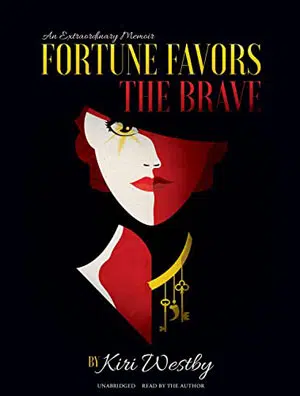 When I was arrested by the Chinese military for launching a historic Tibetan Freedom protest, I knew every trial and lesson had been worth it — even if it meant facing a life in prison.
When I was arrested by the Chinese military for launching a historic Tibetan Freedom protest, I knew every trial and lesson had been worth it — even if it meant facing a life in prison.
After a childhood infused with esoteric Buddhist teachings, I was forged into a global activist through years of witnessing and collaborating in the dissent of women on the front lines of war. From villages in Nepal, to refugee camps in The Democratic Republic of Congo, to the streets of Bogota, Colombia, my initiation into human rights activism was raw and transformative. The bravery of those women bolstered me in my darkest hours of interrogation and torture by the Chinese Police, and it guides me now to share my true story—no matter the repercussions. This is not a tale the Chinese government wants told.
During my years working in war zones, I often wondered if I’d have the courage to stand up to tyranny, to lay my life on the line to confront undeniable persecution.
In 2007 — on the slopes of Mt. Everest — I found out.
Take a literary journey with me as I reveal the bumpy road I took to becoming my bravest self — learning to leverage a life of advantage, find a place for my own joy, and cultivate the courage needed to play a distinct role in history.
Buy it Here: Fortune Favors the Brave

